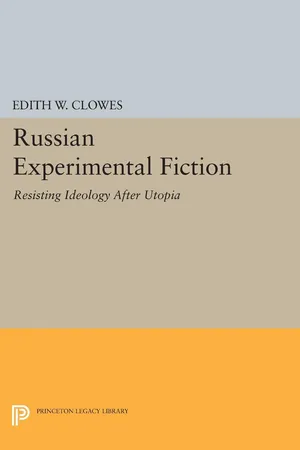
- 254 pages
- English
- PDF
- Available on iOS & Android
About This Book
In the three decades following Stalin's death, major underground Russian writers have subverted Soviet ideology by using parody to draw attention to its basis in utopian thought. Referring to utopian writing as diverse as Defoe's Robinson Crusoe, Dostoevsky's Notes from Underground, and Orwell's Animal Farm, they have tested notions of truth, reality, and representation. They have gone beyond their precursors by experimenting with the tensions between ludic and didactic art. Edith Clowes explores these "meta-utopian" narratives, which address a wide range of attitudes toward utopia, to expose the challenge that literary play poses to dogmatism and to elucidate the sense of renewal it can bring to social imagination. Using both structural analysis and reception theory, she introduces readers outside Russia to a fascinating body of literature that includes Aleksandr Zinoviev's The Yawning Heights, Abram Terts's Liubimov, Vladimir Voinovich's Moscow 2042, and Liudmila Petrushevskaia's "The New Robinsons.".Not advocating its own utopian alternative to current social realities, meta-utopian fiction investigates the function of a deep human impulse to imagine, project, and enforce alternative social orders. Clowes examines the technical innovations meta-utopian writers have made in style, image, and narrative structure that inform fresh modes of social imagination. Her analysis leads to an inquiry into the intended and real audiences of this fiction, and into the ways its authors try to move them toward more sophisticated social discourse.Originally published in 1993.The Princeton Legacy Library uses the latest print-on-demand technology to again make available previously out-of-print books from the distinguished backlist of Princeton University Press. These editions preserve the original texts of these important books while presenting them in durable paperback and hardcover editions. The goal of the Princeton Legacy Library is to vastly increase access to the rich scholarly heritage found in the thousands of books published by Princeton University Press since its founding in 1905.
Frequently asked questions
Information
Table of contents
- Cover
- Contents
- Preface and Acknowledgments
- Note on Transliteration and Translation
- List of Abbreviations
- Part 1: Experimental Fiction Against Ideological Fixation
- Part 2: The Meta-Utopian Experiment in Fiction: Elements of Literaryand Ideological Reanimation
- Part 3: The Reader in the Text: Popularizing the Meta-utopian Mentality
- Bibliography
- Index